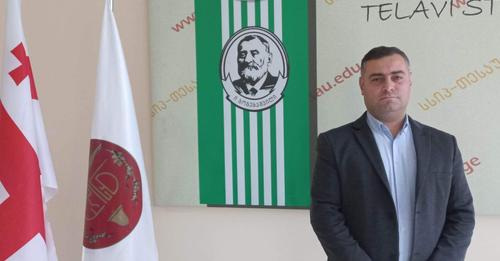- HOME
- ABOUT US
- NEWS
- STUDIES
- Bachelor's Degree
- Master's Degree
- Doctorate
- Integrated Bachelor's and Master's Degree Educational Program for Primary School Teacher Preparation in General Education Bachelor’s and Master’s Integrated Program of Primary Education
- Teacher Training Educational Programme
- Catalogue of Educational Programmes
- Georgian Language Preparation Programme
- RESEARCH
- FACULTIES
- SERVICES
- Rector’s Office
- Office of Information Technologies
- Legal Office
- Chancellery (Registry Office)
- Culture Coordinator
- Sports Coordinator
- LIBRARY
- Vocational Education Center
- Human Resources Management and Student Career Development Service
- Academic Integrity and Student Consulting Center
- Center for Commercialization of Scientific Research Results and Development of Innovations
- Internationalization and Public Affairs Office
- Study Process Management Service
- Financial-Material Resources Management and State Procurement Service
- Psychological counseling center for students
- Center for Professional Development and Innovative Learning
- Personal data protection officer
- Internal Audit Service
Scientific-Research Department StaffHead of Scientific-Research Department Scientific-Research Department Specialist Scientific-Research Department Specialist Scientific-Research Department Specialist Scientific-Research Department Translator Examination Center
Contact Information: Iakob Gogebashvili Telavi State University, Buildign I, Floor III, Examination Center Tel: (+995 350) 23 49 09
Examination Center Staff
Head of the Examination Center Chief Specialist of the Examination CenterChief Specialist of the Examination CenterSpecilaist of the Examination Center Specilaist of the Examination Center Ketevan Javakhishvili
Duties of the Invigilator1. The Lecturer/invigilator is obliged to arrive to the examination place no less than 10 minutes earlier before beginning the examination. 11. The lecturer/invigilator receives the examination paper, examination ticket and signs at the end of the work. Student Behavior Rules during the Examination PeriodStudent Behavior Rules during the Examination
Codes for Lecture CoursesRegulations
Inquiry Forms Syllabus Registers
Doctoral Program Forms Option Forms Self-Evaluation Report (2024)Self-Evaluation Report of Authorization Status Seeker Higher Educational InstitutionSelf-Evaluation Report (2018)Self-Evaluation Report of the Higher Educational Institution
Self-Evaluation Report of Authorization Status Seeker Higher Educational InstitutionSelf-Evaluation Report (2017)Annual Self-Evaluation Report of the Higher Educational Institution Regulation of the Authorization of Educational Institution
Bologna Process
Quality Assurance Office Staff
Head of the Quality Assurance Office
Head of Administration
FACULTY OF SOCIAL SCIENCES, BUSINESS AND LAW
Shalva Tchkadua Date of Birth: 28.09.1980 Marital Status: Married, three children. Education: 2011 - 2012 Beneficiary of Erasmus Mundus ECW Post-Doctoral Program. (University of Sapienza, Rome, Italy) 2009 - 2010 Beneficiary of Erasmus Mundus ECW PhD Program. (University of Macedonia, ATEI, Thessaloniki,Greece) 2007 - 2010 - awarded the Academic Degree of Doctor of History, Iakob Gogebashvili Telavi State University (Research topic: Georgian-Greek Relations at the end of the 20th century and the beginning of the 21st century). 2006 - Master Studies, Iakob Gogebashvili Telavi State University (International Relations and History of Diplomacy). 2004 - Bachelor Studies, Iakob Gogebashvili Telavi State University (International Relations and History of Diplomacy). Working Experience: December 2022 - till now – Rector of Iakob Gogebashvili Telavi State University. 2014 - till now - Associate Professor in Political Sciences, Faculty of Social sciences, Business and Law, Iakob Gogebashvili Telavi State University. 2013- 2022 Head of Quality Assurance Service of Iakob Gogebashvili Telavi State University 2012 - 2014 - visiting lecturer of History, Faculty of Humanities, Iakob Gogebashvili Telavi State University. 2011-2012 - Specialist at the Faculty of Social sciences, Business and Law at Iakob Gogebashvili Telavi State University. 2006– 2011 - Embassy of Greece in Georgia, Defence Attaché Office 2005-2006 - Assistant of administrator at National Education Center of Telavi 2005-2006 - Teacher of the History of Neighbour Countries at Erekle II Gymnasium of Telavi 2004 – 2007 - Teacher of the Greek Language at Greek Society “ELLADA” of Kakheti Region. Conferences: 2020 International conference “Scientific enquiry in the contemporary world: theoretical basics and innovative approach”, San-Francisco, California, USA (paper: “ Civic self-awareness and peculiarities of the Georgian political process”). 2020 International conference“Scientific enquiry in the contemporary world: theoretical basics and innovative approach”, San-Francisco, California, USA (paper: “The Role of Georgian Media in Turning the Political Process“). 2020 International conference “Scientific enquiry in the contemporary world: theoretical basics and innovative approach”, San-Francisco, California, USA (paper: “The results of the study of the Georgian population living in and near the Pankisi Gorge”). 2020 International conference “Scientific enquiry in the contemporary world: theoretical basics and innovative approach”, San-Francisco, California, USA (paper: “The new Corona virus and its reflection on Georgian political processes and business sector” (coauthor: Ia Jimshitashvili) 2018 (September 28-29) 2nd International Scientific conference “Education, Research, Practice”, (presenter), Telavi, Georgia. 2018 (October 5-7) 10th International conference “Health and Ecology”, (presenter), Telavi, Georgia. 2017 (May 1-2) 2nd International conference “Higher Education – New Technologies and Innovations” (presenter), Kutaisi, Georgia. 2016 (July 1-2) 1st International Scientific conference “Education, Research, Practice” (presenter), Telavi, Georgia. 2014 - III International symposium “World War I and the Caucasia” (presenter), Iakob Gogebashvili Telavi State University (paper: Georgia and the western countries - “political processes and parallels”). 2009 - International Conference “Religions and Politics in Europe’s Orients” Presentation Topic “Georgians on the bounds of two Empires: Question of Meskhetians”, Thesaloniki, Greece 2009.2009 - International Conference “Europe, Nations and Borders” presentation topic “Formation of the Political Map of Georgia”, Sofia, Bulgaria. Publications/Scientific Works/Readers: 2022 - Book "Ethnic and cultural Diversity in Kakheti_Leks (Khundzakhs/Avars)", TeSaU. 2020 - Book “Pankisi Gorge – Facts, Events, Analysis” (in Georgian) Georgia,National Science Academy of Georgia, Tbilisi, Georgia (coauthor: Zaur Gumashvili). 2020 - “Civic self-awareness and peculiarities of the Georgian political process”, Proceedings of International Conference “Scientific enquiry in the contemporary world: theoretical basics and innovative approach”, San- Francisco, California, USA. 2020 - “The Role of Georgian Media in Turning the Political Process“, Proceedings of International Conference “Scientific enquiry in the contemporary world: theoretical basics and innovative approach San-Francisco, California, USA Participation in scientific grants: 2023 researcher- scientific-research project_ Ethnic and cultural Diversity in Kakheti – Udies, TeSaU. Language Skills: Georgian (native), English, Greek, Italian. Students' Self-Governance
President of Students' Self-Governance Tengiz Kukunashvili Vice-President of Students' Self-Governance Nika Baganashvili Chair of the Parliament of Students' Self-Governance Chair of Students' Self-Governance Department of Sport Giorgi Tchikadze Chair of Students' Self-Governance Department of Culture Chair of Students' Self-Governance Department of Public Relations Chair of Students' Self-Governance Department of Education Chair of Students' Self-Governance Department of Student Rights Protection Chancellery (Registry Office) Legal Office Office of Information Technologies Rector’s Office Doctoral Programmes Faculty of Agrarian, Natural Sciences and Technologies Faculty of Social Sciences, Business and Law Faculty of Education and Humanities Master Programmes
Faculty of Education and Humanities Modern and Contemporary History of Georgia Faculty of Agrarian Sciences
Faculty of Educational Sciences Faculty of Exact and Natural Sciences Faculty of Social Sciences, Business and Law Bachelor Programmes:
Faculty of Education and Humanities Faculty of Agrarian, Natural Sciences and Technologies Faculty of Social Sciences, Business and Law GOVERNANCE
History of the University
Faculty of Education and Humanities SERVICES LEPL Iakob Gogebashvili Telavi State University represents a study-research organization that, depending on the specifications of the mission and field(s), promotes the integration of teaching and research with economic processes, conducts fundamental and using research, thereby contributing to scientific, economic and cultural development at the regionl and national level. At present, to fully conduct scientific activities, there are four different departments established at the university: 1. Agrarian, Natural Sciences and Technologies; 2. Social Sciences, Business and Law; 3. Education Sciences; 4. Humanities. Accordingly, their basic research profiles are defined: Agrarian sciences; Exact and Natural Sciences; Economics and Tourism; Law, social and Political Sciences; Education (pedagogy, inclusive education), Subject Teaching, Psychology; Georgian and English Philology, History Sciences. From the aforementioned research profiles to the university, depending on the needs of the region, the priority areas of mission and strategic plan are: Agrarian, Tourism and Education directions. At the university also operates: The Caucasus Studies Center, where the problematic issues of both the Caucasus region and the history of neighboring countries and the modern socio-political situation are being studied; Chemistry-technology laboratory, where they are investigating wine, grapes and canned products; Agricultural Laboratory, which serves to study soils, agricultural crops, fertilizers and pesticides in the region; Biology Laboratory, which serves to study the pest/ diseases of microorganisms, especially agricultural crops and another research laboratory that mainly explores aromatic components, such as wine, juice, microorganisms of wine; The university disposal has trial research and demonstration plots that allow for innovation. STUDIES ABOUT US |
|
QUICK LINKS



